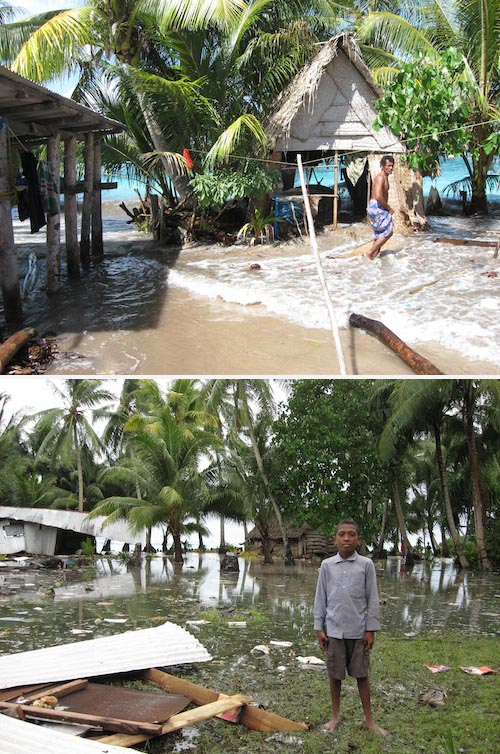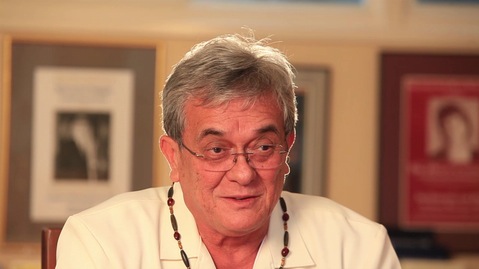Many oceanic islands are likely to become uninhabitable in the course of this century. How we respond to islanders’ plight will be an acid test of our national moral compass. [6 August 2013 | Peter Boyer]

Coastal flooding at Takuu Atoll, Papua New Guinea, December 2008. PHOTO JOHN HUNTER
Imagine this. You live on a tiny island lying just above sea level on one of a number of scattered coral atolls — a dot in the ocean that’s been your people’s only home for over 3000 years.
In your lifetime hundreds of your nation’s people were forcibly removed from their homes so that a Great Power could test nuclear bombs there. Now you must deal with something potentially even more devastating. Your people face having to leave their islands forever.
Nuclear testing aside, Australia and other rich countries don’t pay much attention to the 55,000 people of the Marshall Islands, north of Nauru in the western Pacific. Last week I spoke with someone seeking to change that: Senator Tony de Brum, deputy to the islands’ president. De Brum, who as a child in a fishing boat saw the “western sunrise” of a US hydrogen bomb blast, was in Australia to alert us to the impact of climate change in the Pacific, in the lead-up to the Pacific Islands Forum in Majuro, Marshall Islands, in September.
For millennia the Marshallese managed their own affairs. Then the Germans became their colonial overlords in the late 19th century, followed by Japan from 1917. Whatever troubles this caused the islanders paled into insignificance soon after the United States took over during World War II. Less than a year after dropping atom bombs on Hiroshima and Nagasaki, the US began testing next-generation nuclear weapons on the atolls of Bikini and Enewetak in the northern Marshalls. Over 12 years the US conducted 67 tests involving blasts vastly bigger than the Japanese events.
People living on atolls downwind of the tests knew nothing about nuclear fallout when they saw what looked like snow falling from the sky after the massive “Bravo” blast in March 1954. Children picked up the strange, sticky ash from the blast, and smeared it on their faces. Some tasted it. Within hours they felt sick and vomited. Their skin blistered and began to fall off. They tried to wash but contaminated water made things worse. Animals died and food crops became inedible. Two days later white-clad men landed, took radiation readings and promptly left. Then a ship came and evacuated all the villagers, too late to prevent permanent injury and, for some, a painful death.
Nearly 80 per cent of the total yield from all US atmospheric tests fell on the Marshalls Islands. The islanders sought redress, but found that government pledges of money meant little in the real world. Like the James Hardy asbestos fund, US compensation has been too little, too late.
The Marshallese, who became a sovereign nation in 1986, haven’t let such setbacks dominate their lives. Like all Pacific islanders they’re determined, proud and independent. But a new kind of atmospheric fallout in the 21st century is proving beyond their personal and collective resources. Like nuclear radiation, global warming and acidifying seas are the product of developed industrial economies far distant from the Marshall Islands. Unlike the nuclear “snow”, the rising carbon dioxide concentration that causes it is invisible, but its ramifications are much more widespread.
A rising sea level is one outcome, and Marshall Island atolls are especially vulnerable to its impact. The average rate of increase in global mean sea level in the 20th century was about 1.6 mm a year. Increasing warming has doubled that to over 3 mm a year. According to John Hunter, a Hobart scientist who has extensively studied island vulnerability in the Pacific, local patterns of flood tides and storm surges at the Marshalls’ Kwajalein and Majuro Atolls make them especially sensitive to sea level rise, in the top 10 per cent globally.
De Brum has already seen the impact of this. “These days, every time there’s a full moon the causeways connecting our islands are being inundated and are beginning to break up,” he told me. He acknowledges Hunter’s suggestion that there are things islanders could do, like using sediment from atoll lagoons to raise land levels and nurturing natural coastal defences rather than building sea walls. But he points out that very small economies put severe constraints on all Pacific nations.
The Marshalls’ climate woes don’t end with rising seas. Above-average rain that for two years has saturated the southern islands of the group has completely bypassed the northern Marshalls, leaving communities with dying crops and making people thirsty, hungry and sick. The government has shipped water and food to the afflicted islands, and other countries including Australia have sent aid. But the crisis continues. Having missed the last rainy season, the northern Marshalls are likely to remain without fresh water at least until well into next year.

Senator Tony de Brum of the Marshall Islands. PHOTO SANTA BARBARA INDEPENDENT
In his 68 years in the Marshalls, de Brum has seen nothing like this drought, nor is there anything comparable in the islands’ long history. Climate change, he says, is the topic on every islander’s lips: “We are all asking ourselves, what will happen to our nation? Will we lose our sovereignty?”
The Marshall Islanders aren’t sitting on their hands. The country is doing what it can to adapt to climate change and accelerating its transition to a low-carbon economy. But as its president, Phillip Muller, wrote a few weeks ago, “our efforts will put only a tiny dent in this problem”. De Brum and Muller are seeking “a new, bolder approach” at the next Pacific Islands Forum in Majuro in September, proposing a “Declaration for Climate Leadership” aiming to dispense with the you-go-first dynamic that has undermined international accord.
In the past couple of weeks Kevin Rudd has foreshadowed a surge in Australian spending on Nauru and Manus Island to accommodate people who don’t want to be in the Pacific. If he lifted his gaze just a smidgin to the north he’d see people who do want to be there, and who ask for much less money to help them stave off eviction from their islands after thousands of years. The irony is inescapable. The hypocrisy is breathtaking.
